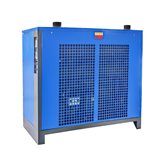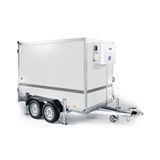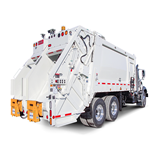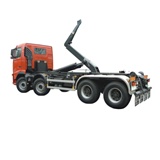Key takeaways: Your fast-track guide to refrigerated truck finance
For business owners who need the bottom line, fast, here are the critical insights into financing a refrigerated truck in Australia for 2025.
- Market growth is your opportunity: The Australian cold chain logistics market is booming, projected to grow by an average of 7.1% annually to reach over $9.2 billion by 2028. This surging demand for temperature-controlled transport of food, pharmaceuticals, and other goods means a refrigerated truck is a high-potential asset for your business.
- Chattel mortgage is king: For over 90% of Australian businesses with an ABN, a Chattel Mortgage is the most effective finance product. It allows you to claim the GST on the truck's purchase price upfront in your next BAS statement and claim depreciation and interest payments as tax deductions.
- Typical finance costs: As of late 2025, expect interest rates for commercial vehicle finance to range from approximately 6.5% to 12% p.a., depending on your business history, credit score, and the age of the truck. A strong application could secure a rate under 8%.
- Price point & repayments:
- Small Refrigerated Van ($80,000): Expect monthly repayments of around $1,600 - $1,850 over a 5-year term with no balloon payment.
- Medium Rigid Truck ($180,000): Prepare for monthly repayments in the range of $3,600 - $4,100 on a 5-year term.
- Approval essentials: Lenders prioritise a clean credit history, an ABN registered for at least 1-2 years, and demonstrated business income. Low-doc options are available for newer businesses but may attract slightly higher interest rates.
- The broker advantage: Using a specialist equipment finance broker can increase your approval chances by over 25%. They have access to a wider panel of lenders, including those who don't deal directly with the public, and can structure your application for the best possible outcome.
Your ultimate guide to financing a refrigerated truck in Australia
Investing in a refrigerated truck, or 'reefer', is a significant step towards capturing a lucrative slice of Australia’s ever-expanding logistics and transport industry. From farm-to-table produce and gourmet food delivery to critical pharmaceutical transport, the demand for reliable cold chain services has never been higher. A recent industry report highlights that the grocery delivery sector alone has seen a 35% surge in demand since 2022, directly fuelling the need for more temperature-controlled vehicles on our roads.
But acquiring this vital business asset involves a substantial capital outlay. Whether you're an established logistics company expanding your fleet or a sole trader starting a new venture, navigating the world of truck finance can be complex. This comprehensive guide will break down the finance scenarios, explain what lenders are looking for, and provide you with actionable advice to secure the right funding for your refrigerated truck in Australia.
The growing demand: Why investing in a refrigerated truck makes sense in 2025
The Australian economy relies heavily on its cold chain. The transportation of temperature-sensitive goods is a non-negotiable part of our supply chain.
- Food & beverage sector: With the rise of online grocery shopping and gourmet meal kits, the 'last mile' delivery of fresh and frozen goods is a key growth area.
- Pharmaceutical & healthcare: The transport of vaccines, medicines, and biological samples requires precise and verifiable temperature control, a premium service that is constantly in demand. According to the Bureau of Infrastructure and Transport Research Economics (BITRE), road freight is the dominant mode for these high-value goods.
- Agriculture & exports: Moving fresh produce from farms to domestic markets and export hubs is the backbone of Australian agriculture.
This sustained demand makes a refrigerated truck a high-utility, income-generating asset. Getting the finance right is the first step to capitalising on this opportunity.
Understanding your financing options: The best loan structures for refrigerated trucks
When financing a business asset like a truck, you have several options. However, one stands out as the most popular and beneficial for Australian businesses.
Chattel mortgage: The top choice for Australian businesses
A Chattel Mortgage is a commercial loan where a lender provides the funds to purchase a movable asset (the 'chattel' - in this case, your truck), and you take ownership of the vehicle from day one. The lender takes a 'mortgage' over the truck as security until the loan is fully paid.
Why it's recommended:
- Full ownership: You own the truck immediately, meaning it's an asset on your balance sheet from the start.
- GST benefits: If you are registered for GST, you can claim the entire GST portion of the truck's purchase price back on your next Business Activity Statement (BAS). On a $150,000 truck, this means a potential cash flow boost of around $13,636.
- Tax deductibility: You can typically claim the loan interest and the truck's depreciation as tax deductions against your business income.
- Flexible terms: Loan terms usually range from 2 to 7 years (5 years is most common), and you can opt for a 'balloon' or 'residual' payment at the end to lower your regular monthly repayments.
Finance lease
A Finance Lease is essentially a long-term rental agreement. The lender purchases the truck, and you lease it from them for a fixed period. At the end of the lease, you can choose to pay a residual value to take ownership, trade it in for a new model, or extend the lease.
- Best for: Businesses that want to keep large assets off their balance sheet and prefer a predictable, fixed expense. It can also be beneficial for those who want to upgrade their fleet regularly.
- Considerations: You don't own the asset during the lease term, and lease payments are treated as a rental expense for tax purposes.
Commercial hire purchase
Similar to a Chattel Mortgage, a hire purchase is an agreement where the lender buys the truck and hires it out to you. You gain ownership of the truck only after the final payment is made. This option is less common now due to the superior GST benefits of a Chattel Mortgage.
Finance scenarios: What to expect for different price points
Let's break down what financing looks like for different classes of refrigerated vehicles. These figures are illustrative, based on a 5-year (60-month) term and an indicative interest rate of 8.0% p.a. for a strong applicant.
Scenario 1: The small refrigerated van
Ideal for last-mile urban deliveries, catering, and florists.
- Approximate asset cost (New): $80,000 + GST
- Loan amount: $80,000
- Term: 60 months
- Balloon payment: $0
- Estimated monthly repayment: $1,622
- Total interest paid: ~$17,320 over 5 years.
Scenario 2: The medium-duty rigid truck
The workhorse of the industry, perfect for supermarket distribution, local produce haulage, and larger delivery runs.
- Approximate asset cost (New): $180,000 + GST
- Loan amount: $180,000
- Term: 60 months
- Balloon payment: 20% ($36,000) - This reduces monthly repayments.
- Estimated monthly repayment: $3,075
- Total interest paid: ~$36,450 over 5 years (plus the final balloon payment).
Scenario 3: The heavy-duty prime mover & reefer trailer
For long-haul, interstate freight and large-scale logistics operations.
- Approximate asset cost (New): $400,000 + GST
- Loan amount: $400,000
- Term: 60 months
- Balloon payment: 25% ($100,000)
- Estimated monthly repayment: $6,505
- Total interest paid: ~$70,300 over 5 years (plus the final balloon payment).
Getting approved: What lenders look for in your application
Securing finance is about presenting your business as a reliable, low-risk investment. Here's what finance companies scrutinise:
- Business profile & ABN history: Most mainstream lenders want to see an ABN that has been active and registered for GST for at least two years. Businesses with a longer, stable trading history will always secure better terms.
- Credit history (business and personal): A clean credit file is paramount. Lenders will check both the business's credit file and the directors' personal files. A single default can complicate an application, so it's vital to know your credit score beforehand.
- Financial documentation (full doc vs. low doc):
- Full doc loan: This is the standard application, requiring 1-2 years of business financial statements, tax returns, and BAS statements. It provides a complete picture of your business's financial health and will secure the best interest rates.
- Low doc loan: Designed for new businesses or those with complex financials. You might only need to provide a few recent BAS statements or an accountant's letter. While more accessible, expect a slightly higher interest rate to compensate the lender for the increased risk.
- The asset itself: Lenders have guidelines on the age and type of truck they will finance. A new or near-new truck from a reputable brand like Isuzu, Hino, or Scania is seen as excellent security. Financing a truck older than 10-12 years can be more challenging.
- Deposit and trade-in: While 100% finance is common, providing a deposit (typically 10-20%) or using a trade-in significantly strengthens your application. It demonstrates your commitment and reduces the lender's risk, which can lead to a lower interest rate.
The broker advantage: Why a specialist finance broker is your best ally
You could approach your bank directly, but for specialised equipment like a refrigerated truck, a finance broker offers a significant edge.
- Market access: A broker has access to dozens of lenders, from major banks to specialised asset finance companies. This includes niche lenders who understand the transport industry and may offer more favourable terms.
- Application strategy: They know exactly what each lender wants to see. A good broker will package your application to highlight its strengths and mitigate any weaknesses, drastically improving your chances of first-time approval.
- Saving you time and hassle: Instead of you filling out multiple applications, the broker does the legwork, negotiating with lenders on your behalf to find the most competitive deal.
- Structuring the deal: They can provide expert advice on loan terms, balloon payments, and structures that align with your business cash flow and long-term goals.
Red flags: Common pitfalls to avoid when financing your truck
Be a savvy borrower. Watch out for these common traps:
- Focusing only on the interest rate: Always ask for the comparison rate, which includes most upfront and ongoing fees. Also, be wary of "rate-beat" guarantees that might hide costs elsewhere.
- Unsuitable balloon payments: A large balloon payment lowers your monthly costs, but it can be a shock at the end of the term. Ensure the balloon amount is realistic and reflects the truck's expected resale value. A 20-30% balloon on a 5-year term is generally considered reasonable.
- Hidden fees: Scrutinise the loan contract for establishment fees, ongoing account-keeping fees, and hefty early-payout penalties.
- Ignoring the total cost of ownership (TCO): Your finance repayment is just one part of the cost. Factor in fuel, insurance, registration, maintenance, and potential repairs when assessing affordability. A newer, more fuel-efficient truck with a warranty might have a higher purchase price but a lower TCO.
Frequently asked questions (FAQs) about refrigerated truck finance
Q1: Can I get finance for a second-hand refrigerated truck in Australia?
Absolutely. Lenders will finance used trucks, but they have conditions. Generally, the truck should be no older than 12-15 years at the end of the loan term. The lender will require a supplier invoice and may want to see a mechanical inspection report to verify the asset's condition, especially the refrigeration unit.
Q2: What is a balloon payment and is it a good idea for a truck loan?
A balloon payment (or residual value) is a lump-sum payment due at the end of your loan term. It's a strategic tool to reduce your regular monthly repayments, improving your business's cash flow. It's a good idea if:
- You plan to sell or trade in the truck at the end of the term and use the proceeds to pay out the balloon.
- You are confident you will have the funds available to pay it off.
Always ensure the balloon amount is in line with the truck’s projected market value to avoid being left with a shortfall.
Q3: Do I need a deposit to finance a refrigerated truck?
Not always. For established businesses with a strong financial history, many lenders offer no-deposit (100%) finance. However, for new businesses or those with a weaker credit profile, a deposit of 10-20% may be required to secure approval.
Q4: How long does it take to get approved for truck finance in Australia?
The timeline can be surprisingly fast. With a specialist broker and a straightforward application (e.g., a strong business applying for a new truck), you can often get pre-approval within 24-48 hours. The final settlement and funding can be completed in as little as 2-3 business days once the supplier invoice is provided.
Q5: Can a new business or sole trader get finance for a refrigerated truck?
Yes, it is possible. While mainstream banks may be hesitant, there are specialised lenders who cater to new ventures. You will likely need to provide a solid business plan, cash flow projections, proof of industry experience, and potentially a deposit. A "low-doc" loan is a common pathway for new ABN holders.
Q6: What are the main tax implications of a Chattel Mortgage?
Consult with your accountant for specific advice, but the key tax benefits of a Chattel Mortgage for a business registered for GST are:
- You can claim the full GST component of the truck's purchase price in your next BAS.
- You can claim the interest paid on the loan as a tax deduction.
- You can claim depreciation on the vehicle as a tax deduction. This can be accelerated under current government incentives like the Instant Asset Write-Off, if applicable.
Conclusion
Financing a refrigerated truck is a powerful investment in Australia's booming cold chain industry. Your success hinges on a smart financial strategy: choosing the most effective structure like a Chattel Mortgage, understanding what lenders require for approval, and engaging an expert to navigate the market.
Use this guide to prepare your application and consult with a specialist equipment finance broker. A well-planned approach will put you in the driver's seat, ready to capitalise on the significant opportunities ahead.




















